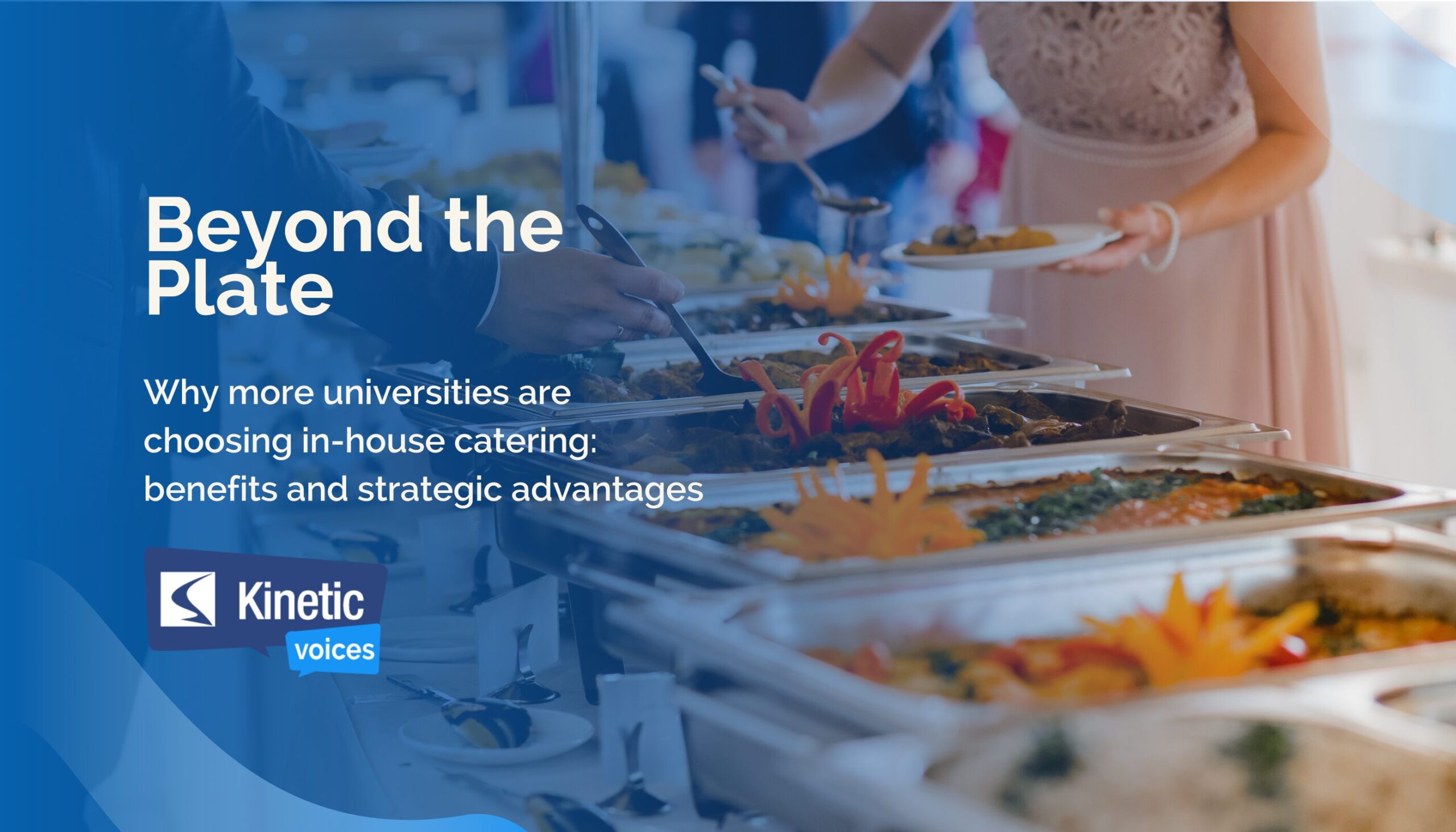For universities, catering is about far more than just providing food and drink for students, staff and visitors. When done well, it can become the heart of a campus’s ecosystem, which means that the choice between bringing in external providers or working to cultivate in-house teams is a critical one.
Outsourcing does offer particular advantages, including potential cost efficiencies through economies of scale and allowing the university to focus on its core mission of education, rather than the potentially complicated task of running a hospitality business. External providers can also offer guarantees around areas such as compliance and risk management, which adds an extra level of convenience.
So what makes so many universities opt to manage their own catering? And how can institutions go about weighing up the questions of cost, flexibility, quality control, and logistics?
Generating revenue through internal events
Catering is managed internally at Royal Holloway, University of London, explains Marketing Executive Carol Robinson, where hosting events offers another stream of revenue thanks to the institution’s historic Grade I listed building and surroundings, which make it a popular spot for outdoor events in the summer months. Running these with in-house teams means that the university can offer tiered pricing, she continues, with a cheaper rate for academics from the institution and a separate corporate price for other users to bring in extra funding.
Creating a sustainable supply chain
The University of Exeter’s offering includes 20 catering and retail outlets across two campuses, as well as hospitality events such as dinners and conferences, all of which are run internally, explains Executive Chef Richard Narramore. One of the key benefits of this approach is greater control over vital elements such as the ethical supply chain that supports regional small and medium enterprises, he says.
Richard Narramore
Executive ChefUniversity of Exeter
“We buy MSC-certified seafood, free-range eggs, and our butcher is just 13 miles away.”
This hands-on, sustainability-focused approach also means more room for experimentation, he continues, such as a recent foray into offering venison as a meat option alongside beef, as now widely recommended for health and environmental benefits. The catering team is still “just testing the ground” and seeing what uptake is like, he explains, but the hope is that digital messaging around campus will help to get the word out that it’s considered a more suitable, healthier option.
Investing back into the student experience
While outsourcing catering may present some advantages, in-house catering not only meets the needs of the hospitality team but can make a remarkable difference in enhancing student life, too.
At the University of Strathclyde, for instance, surplus revenue created by events can be reinvested into student-facing retail catering, allowing for lower prices and better value for students, explains Graham Paterson, Head of Catering. In 2023–24, the conference and events business hosted more than 600 events and 47,000 delegates on campus, generating revenue over £2.7m, which represents a 29 per cent year-on-year increase.
And that means the team can creatively utilise its combined catering budget to fund innovative programs that create unforgettable teaching moments, as well as providing an opportunity for students to bond and connect. That sense of connection should be a key concern for catering teams: a 2024 survey of more than 600 undergraduates in the US found that food is “the number one driver of campus engagement,” with 54 per cent of students highlighting the main appeal of dining halls as being a place to “eat and socialise with friends.”
Graham Paterson
Head of Catering
University of Strathclyde
“Managing a combined internal catering budget allows us to do a lot more creative things with and for students and staff.”
He gives the example of the newly developed community cooking programme, in which groups of new students in cluster flats who don’t know each other are taught basic cooking skills in a demonstration kitchen.
Graham Paterson
Head of Catering
University of Strathclyde
“As a socially progressive university, we have a high proportion of students from the index of multiple deprivation areas, who might not have had the exposure to cooking with fresh ingredients or the understanding of how to prepare even simple dishes safely. So, we’ve created a programme that will allow them to come in, meet their new student friends, and learn how to cook.”
This “comes purely at a cost” to the catering department, he continues, but can be covered by different areas of the provision that do generate income, which is a clear, “real-time benefit” of an in-house approach.
Graham Paterson
Head of Catering
University of Strathclyde
“There’s a whole host of different things that we can do in terms of the flexibility, the agility to react without the additional penalties we might have within a structured contract for catering, we have much more control over what we do.”
Encouraging creativity and collaboration
Ultimately, Carol Robinson adds, an internal approach can mean a more creative, exciting and collaborative way of working, where the chefs are “always looking at new ways of doing things,” from visiting other markets and universities to attending street food fairs.
Carol Robinson
Marketing Executive
Royal Holloway, University of London“There are lots of chats and WhatsApp groups, and forums online. And people are always posting questions: has anyone done this? Or, we’re thinking about this, has anyone else tried it? And the responses are great, it’s nice like that. People chat and share ideas.”
A strategic decision
Ultimately, the decision for a university to manage catering internally or externally hinges on the evaluation of priorities and resources. While external providers may offer simplicity, cultivating in-house teams can offer the kind of agility and creative freedom that allows for a more direct, meaningful connection with all of the campus community. If you’re exploring how this approach could work at your institution, learn more about our catering solutions.
To learn more about how we can support your institution, contact the Sales Team at sales@kineticsoftware.com.






